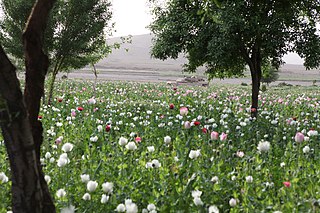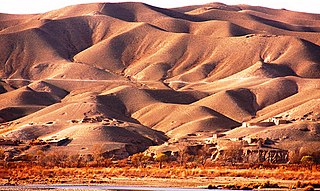
Helmand,also known as Hillmand,in ancient times,as Hermand and Hethumand,is one of the 34 provinces of Afghanistan,in the south of the country. It is the largest province by area,covering 58,584 square kilometres (20,000 sq mi) area. The province contains 18 districts,encompassing over 1,000 villages,and roughly 1,446,230 settled people. Lashkargah serves as the provincial capital. Helmand was part of the Greater Kandahar region until made into a separate province by the Afghan government in the 20th century.

Afghanistan has long had a history of opium poppy cultivation and harvest. As of 2021,Afghanistan's harvest produces more than 90% of illicit heroin globally,and more than 95% of the European supply. More land is used for opium in Afghanistan than is used for coca cultivation in Latin America. The country has been the world's leading illicit drug producer since 2001. In 2007,93% of the non-pharmaceutical-grade opiates on the world market originated in Afghanistan. By 2019 Afghanistan still produced about 84% of the world market. This amounts to an export value of about US$4 billion,with a quarter being earned by opium farmers and the rest going to district officials,insurgents,warlords,and drug traffickers. In the seven years (1994–2000) prior to a Taliban opium ban,the Afghan farmers' share of gross income from opium was divided among 200,000 families.

Mullah Abdul Rauf Aliza,widely identified as Mullah Abdul Rauf Khadim,was an Afghan militant who served as a senior leader in both the Taliban and ISIS-K.
Sher Mohammed Akhundzada is an Alizai tribal leader who was the Governor of Helmand in Afghanistan from 2001 to 2005. As governor,he implemented various agricultural projects in Helmand,including canal excavation from the Kajaki dam for irrigation and electricity generation projects. He was deeply involved in opium production and smuggling,leading to his removal from office by the Afghan government in 2005 after lobbying by the British,who were leading counter-narcotic efforts in Afghanistan at the time. He was succeeded as governor of Helmand by Mohammad Daoud.
Mohammad Daoud was the governor of Helmand in Afghanistan until he was removed from his post for his ties to the opium trade. Daoud was appointed in December 2005,and replaced in December 2006 after the insistence of the British ISAF troops. The U.S. used the warlords to help them hunt Al Qaeda and the Taliban and it is rumored this extended to ignoring their involvement in the production and sale of opium.

Musa Qala is a district in the north of Helmand Province,Afghanistan. Its population was around 57,500 in 2012 and are 97% ethnic Pashtun. The district centre is the village of Musa Qala;there are 19 other large villages and 200 smaller settlements,mostly along the Musa Qala River. The area is irrigated by the Helmand and Arghandab Valley Authority.

Musa Qala is a town and the district centre of Musa Qala District in Helmand Province,Afghanistan. It is located at 32.4433°N 64.7444°E and at an altitude of 1,043 m in the valley of Musa Qala River in the central western part of the district. Its population has been reported in the British press to be both 2,000 and 20,000. It is in a desolate area,populated by native Pashtun tribes.

Nāwa-I-Barakzāyi District or Trek Nawa is an administrative district in Helmand Province,Afghanistan located south of the provincial capital of Lashkar Gah along the Helmand River. It is bordered by the districts of Lashkar Gah,Nad Ali,Garmsir,and Rig,as well as the provinces of Nimruz and Kandahar. It falls within the area known as Pashtunistan,,an area comprising most of southeast Afghanistan and northwest Pakistan. The dominant language is Pashto and many of the 89,000 residents practice the traditional code of Pashtunwali. Nawa-I-Barakzayi's name reflects the dominant Pashtun tribe in the district,the Barakzai. Prior to the 1970s,it was called Shamalan after a small village at the south end of the district

The Helmand province campaign was a series of military operations conducted by the International Security Assistance Force (ISAF) forces against Taliban insurgents and other local groups in the Helmand Province of Afghanistan. Their objective was to control a province that was known to be a Taliban stronghold,and a center of opium production. None of the ISAF's intended strategic and political objectives were achieved in the long term.
The Battle of Musa Qala was a British-led military action in Helmand Province,southern Afghanistan,launched by the Afghan National Army and the International Security Assistance Force (ISAF) against the Taliban on 7 December 2007. After three days of intense fighting,the Taliban retreated into the mountains on 10 December. Musa Qala was officially reported captured on 12 December,with Afghan Army troops pushing into the town centre.
Abdul Qayyum "Zakir",also known by the nom de guerre Abdullah Ghulam Rasoul,is a Taliban militant commander and the acting Deputy Minister of Defense of the internationally unrecognized Taliban regime currently ruling Afghanistan. He was also the acting Defense Minister of the Taliban,from 24 August 2021 to 7 September 2021.

Mohammad Gulab Mangal is an Afghan politician. Since October 2016,he has been serving as the senior adviser minister of borders and tribal affairs for the president of the Islamic Republic of Afghanistan. He is also actively involved in the tribal conflict resolutions. On 23 October 2016,he was appointed as the senior adviser for the minister of borders,tribal affairs,and provincial governor of Nangarhar province until he resigned in April 2018. From 22 April 2015 to 23 October 2016,based on the presidential decree,he was appointed as the acting minister of Ministry of Borders and Tribal Affairs. In 2002,he was elected as the Representative of Paktia Province for Emergency Loya Jirga. From 2002 to 2004,he was the Head of Constitution office for the south east region(Paktia,Paktika,Khost and Ghazni provinces and also Head of Constitution Loya Jirga election office for the South East Region. From 2004 to 2006,he served as Governor of Paktika province. From 2006 to 2008,he served as the Governor of Laghman province. From March 2008 to September 2012,he served as provincial governor of Helmand province.
Mullah Abdul Salaam Alizai is a former member of the Taliban movement who defected to the Afghan government in December 2007. He is a leader of the Alizai,a Pashtun tribe.

Mohammed Daud Daud General Mohammad Daud Daud پیروراستینمسعود,one of the Tajik generals,was 41 years old when he was killed. and was the general commander of the police in the north and northeast of Afghanistan.

The siege of Musa Qala took place between July 17 and September 12,2006 in Afghanistan's Helmand province. A small force of International Security Assistance Force (ISAF) troops and Afghan security forces were besieged by Taliban insurgents inside the district centre of Musa Qala.
The Battle of Nawzad (2006–2014) was a battle between ISAF (coalition) forces and Taliban insurgents in Nawzad at the center of Nawzad district in the northern half of Helmand Province,southern Afghanistan.

Mullah Hibatullah Akhundzada,also spelled Haibatullah Akhunzada,is an Afghan cleric who is the supreme leader of Afghanistan in the internationally unrecognized Taliban regime. He has led the Taliban since 2016,and came to power with its victory over U.S.-backed forces in the 2001–2021 war. A highly reclusive figure,he has almost no digital footprint except for an unverified photograph and several audio recordings of speeches.
Akhundzada is an Afghan surname. Notable people with the surname include:
The politics of Afghanistan' are based on a totalitarian emirate within the Islamic theocracy in which the Taliban Movement holds a monopoly on power. Dissent is not permitted,and politics are mostly limited to internal Taliban policy debates and power struggles. As the government is provisional,there is no constitution or other basis for the rule of law. The structure is autocratic,with all power concentrated in the hands of the supreme leader and his clerical advisors. According to the V-Dem Democracy indices Afghanistan was as of 2023 the 4th least electoral democratic country in the world.











